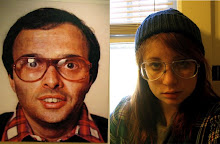Buckminster is a name that one cannot forget. I am surprised that I had never heard his name until recently when I saw a documentary about him. I think that his most important invention was the dome house. In a time where the population is rising tremendously and there is growing concern about an eventual decrease in resources, the dome house which didn't use up much space or resources seemed like just what the world might need. I'm wondering why they did not catch on more. A couple of days ago I overheard some of my friends discussing dome houses and how there are a decent amount here in good old Wisconsin because they keep in a decent amount of heat and things... but they didn't mention who it was who is famous for popularizing this design of house. I say "popularizing" because Fuller was not the absolute first person ever to have the idea to make a building in dome shape, but he was the one who made it famous. The fact that my friends didn't mention the inventor of the dome house got me thinking about whether or not it's important to know where the everyday items you use come from. Would we see things differently if we could attach a story to them? Would we take things for granted less if we actually thought about all of the work that went into creating them?
The fact that Fuller's dome houses are not everywhere also got me thinking about other inventions that seem like they would really help the world but that don't actually get lasting recognition. The example that I'm thinking about in particular is the electric car. Watching the film Who Killed The Electric Car? really infuriated me. The fact that this technology exists and is not being utilized is really frustrating.
Saturday, January 23, 2010
Subscribe to:
Post Comments (Atom)

I agree that even though I may never watch that documentary again, I will remember his name. Its ironic how many inventions in our world such as the electric car gain alot of hype and recognition when they come out, but once the phase of these items die eye, is it really that we don't have use for it anymore, or that we're waiting on the next best/bigger thing? I think Fuller would challenge us on how we can control the amount of things we invent in moderation.... what important things do we reaaly need a whole..? -questions like that.
ReplyDeleteEvery manufactured object in our everyday life has a story. There is a person designing, marketing, manufacturing the object and later a "material culture" curator studying it. The politics behind the failure of the electric car no doubt are intense.
ReplyDelete